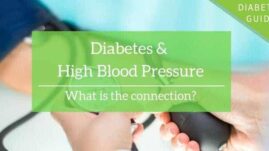Anxiety is very common in people with diabetes, and for good reason.
In life with diabetes — type 1 or type 2 — there can be a constant feeling of worry and stress throughout every part of every day because your blood sugar is never still. And as we know all too well, blood sugars too high or too low can both have a variety of consequences with varying degrees of danger.
In this article, we’ll discuss what anxiety is, why people with diabetes are more likely to develop generalized anxiety disorders, the latest research on diabetes and anxiety, and treatment options available today.

Table of Contents
- What is anxiety?
- Why anxiety is so common in people with diabetes
- Research on diabetes and anxiety
- Anxiety in youth with type 1 diabetes negatively impacts diabetes management
- Patients with type 2 diabetes exhibit more signs of anxiety than those without
- Pregnant women with diabetes at a higher risk for anxiety
- Depression and anxiety may increase a patient’s risk of type 2 diabetes
- Symptoms of depression or anxiety in patients with type 2 diabetes associated with a lower exercise frequency
- Managing and treating anxiety as a person with diabetes
What is anxiety?
Anxiety is essentially intense worry about something that might happen or something that has an unpredictable outcome (ie: something you can’t control).
While nearly everyone experiences temporary moments of anxiety in life, it becomes a problem when the amount or frequency of your anxiety is disproportionate and affects your daily life. This degree of anxiety would qualify as a “generalized anxiety disorder” or “panic disorder.”
According to the National Institute of Health, symptoms of an anxiety disorder include:
- Excessive anxiety or worry, most days, for at least 6 months
- Feeling on edge, restless, or wound up
- Feeling overly tired, mentally and/or physically
- Difficulty concentrating
- Feeling as though your mind is “blank”
- General irritability and anger
- Overreacting to small things
- General muscle tension
- Difficulty sleeping, including insomnia, waking up frequently, or feeling exhausted despite plenty of sleep
- When these symptoms are affecting your personal relationships, work-life, education, and ability to maintain your day-to-day responsibilities and self-care
Symptoms of a panic disorder and an actual panic attack include:
- Recurrent and unexpected panic attacks
- Intense fear that comes on quickly, reaching peak intensity within minutes
- Triggered often by an object, situation, location, or experience
- Heart palpitations or “racing” heartbeat
- Sweating
- Trembling or shaking
- Shortness of breath
- Feeling as though you’re being smothered or choking, unable to breathe fully
- Feelings of impending doom
- Feeling out of control
- The eventual development of a severe phobia of a certain thing, place, or situation
Why anxiety is so common in people with diabetes
Researchers at Yale once said that diabetes and anxiety are practically cousins. When you take a chronic illness (type 1 or type 2 diabetes) that revolves around constant decisions that create constant fluctuations in your blood sugar — and those fluctuations can be intensely dangerous — you have the perfect recipe for anxiety.
And of course, with both types of diabetes, the constant worry about long-term complications is always present, and something we are constantly reminded of by healthcare professionals and the media.
Type 1 diabetes and anxiety
Type 1 diabetes, which relies on the constant micromanagement of insulin, can lead to the development of anxiety due to a generalized fear of complications, “imperfect” blood sugar levels, mild or severe low blood sugars, and the constant effort for control.
In life with type 1 diabetes, the more variables a patient is able to control, the more he or she is presumably able to manage their blood sugar levels. Food, activity, hormones, stress, hydration, blood sugar fluctuations during work or school or parenting, and even something as simple as grocery shopping, all have a major and immediate impact on blood sugar levels.
When one or many of these variables are out of one’s control — which is likely often — anxiety can easily develop. (Diabetes burnout can develop as a result of anxiety, too!)
Type 2 diabetes and anxiety
In type 2 diabetes, some patients are taking insulin or other medications that can lower blood sugar. These patients would be just as vulnerable to developing anxiety around mild or severe hypoglycemia described above, and the constant effort for control over something that can never be truly controlled.
Type 2 diabetes also presents a general feeling of helplessness and overwhelm, because the responsibilities and daily discipline required to hopefully improve blood sugar levels can be daunting and feel impossible to adhere to long-term.
Feeling as though you should be doing this, this, and that perfectly every single day but knowing those expectations are more than you can bear can easily produce feelings of failure and defeat, which only feeds anxiety further.
Fear, diabetes, and anxiety
Fear is a big part of anxiety — and easily a big part of living with diabetes. Anyone with diabetes, at any age, could develop enough fear around a particular aspect of living with diabetes that it becomes a significant struggle to manage their diabetes well, or it begins impacting other aspects of their day-to-day life.
These diabetes-related fears could include:
- High blood sugars
- Low blood sugars
- Needles and injection pain
- Dosing insulin for foods with uncertain carb contents
- Dosing insulin for difficult foods like pizza or cake
- Dosing insulin for foods you don’t normally eat
- CGM sensor application
- Insulin pump infusion site application
- CGM arrows of increasing or decreasing blood sugar levels
- Carbohydrates or other specific food groups
- Blood sugar fluctuations at work, school, playground, swimming, etc.
- Developing a diabetes complication
One of the most common fears that develop in people with diabetes is a fear of low blood sugar. Let’s take a closer look at this.
Fear of low blood sugar (hypoglycemia)
Fear of low blood sugar is a very common and justified form of anxiety that anyone taking insulin or other medications that decrease blood sugar levels could develop.
Often, severe anxiety and fear around lows develop after experiencing an intensely severe low blood sugar that left you unconscious, in need of a glucagon injection, seizing, or occurred during a situation like when you were driving.
A traumatic low blood sugar experience can completely rob a person of their confidence in their ability to manage and treat the average low blood sugar. A severe low could happen to any of us — and coming back from that experience psychologically isn’t easy.
The biggest challenge with a fear of hypoglycemia is that you will inevitably experience low blood sugars again in the future — unless you purposefully run your blood sugars high all the time in an effort to avoid them altogether. This doesn’t, however, appease your anxiety because now you are putting your long-term health and safety in danger with consistently high blood sugar levels.
Rebuilding your confidence in your ability to manage your low blood sugars — and bring your blood sugars back into a healthy range overall — takes time.
Diabetes psychologist Dr. Mark Heyman from the Center for Diabetes and Mental Health works with his patients on exactly this.
“I try to help patients step back at really look at the context of what happened in order to regain a sense of confidence in their ability to manage their blood sugars”
Dr. Heyman — who has also lived with type 1 diabetes for over 20 years — also helps patients rebuild their confidence by setting them up for mild lows right there in his office, with their full consent. By seeing that they can treat a normal low blood sugar on their own, they gradually gain more comfort in allowing their blood sugars to come down into safer ranges on a daily basis.
In general, patients struggling with purposeful high blood sugars to manage their anxiety around lows can also work with their healthcare team to gradually adjust their insulin doses — bit by bit over the course of weeks — to come down to a safer range.
While the goal for most of us with diabetes is blood sugars between 70 to 160 mg/dL, for some struggling with anxiety, aiming for blood sugars between 150 to 200 mg/dL is going to be significantly safer for their long-term health than the 250 to 350 mg/dL range they’ve been in.
Talk to your healthcare team! Explain to them how you’re feeling, and how you’ve been coping by restricting insulin to keep your blood sugars higher and ask for help
Research on diabetes and anxiety
You know you’re not alone in your feelings of anxiety as a person with diabetes when there’s a slew of research on the topic. In fact, there’s so much research on anxiety in patients with diabetes that you should feel quite justified in your own struggle with it!
Anxiety in youth with type 1 diabetes negatively impacts diabetes management
Being a teenager is hard enough, adding diabetes management to the experience of growing up is tremendously challenging, particularly mentally.
This 2016 study from Australia determined that youth with type 1 diabetes who were struggling with anxiety and depression had severely “compromised” blood sugar management.
Of course, higher blood sugar levels also increase general feelings of depression, a lack of energy, and a lack of enthusiasm for the usual joys of life, which only exacerbates anxiety further.
The research concluded that young people with diabetes should be screened more frequently for signs of depression and anxiety, and provided with support sooner, too.
Another 2018 study from Yale on youth with type 1 diabetes added that this population also faces an increased risk for eating disorders — likely a direct result of the anxiety that can develop around food, activity, and weight.
Patients with type 2 diabetes exhibit more signs of anxiety than those without
This 2016 study from North Carolina found that patients with type 2 diabetes exhibited clinical and subclinical” symptoms of anxiety more frequently than patients without diabetes.
Researchers also found that patients with anxiety frequently have more difficulty reaching blood sugar goals and an increased incidence of diabetes-related complications.
Another 2018 study from Bulgaria found that women with metabolic syndrome (which includes type 2 diabetes) also have higher rates of anxiety and depression compared to patients without metabolic syndrome.
Pregnant women with diabetes at a higher risk for anxiety
The constant pressure during pregnancy to achieve nearly perfect blood sugar levels can be overwhelming.
Anxiety isn’t just likely, it should be expected, as supported by this 2016 study in Brazil. While it is one of the most incredible challenges a woman could undertake, managing diabetes during pregnancy can be incredibly stressful.
Because there are even more variables affecting blood sugar levels during pregnancy, tighter management requires constant blood sugar checks and adjustments in insulin doses, along with the pressure of knowing that your blood sugar impacts your baby’s well-being minute-by-minute.
The study did conclude, however, that the anxiety was quite generalized around the entire pregnancy rather than being related to a particular blood sugar level at any given time.
Depression and anxiety may increase a patient’s risk of type 2 diabetes
This 2017 study from Florida and Indiana found that 25 percent of patients with depression and anxiety developed type 2 diabetes within the 10-year period of the study. And concluded that helping patients prevent the development of diabetes should include more adequate treatment and screening for mental health issues.
“These findings suggest that screening positive for anxiety is a risk factor for diabetes mellitus in older adults independent of depression and traditional diabetes mellitus risk factors,” explained the researchers.
“Anxiety requires greater consideration and awareness in the context of diabetes mellitus risk assessment and primary prevention.”
Symptoms of depression or anxiety in patients with type 2 diabetes associated with a lower exercise frequency
This 2017 study from Canada found that patients with type 2 diabetes who were struggling with mental health issues like depression and anxiety also exercised less frequently.
Researchers also concluded that these findings were not occurring side-by-side but that depression is a genuine obstacle or barrier to getting regular exercise in this population of patients.
Managing and treating anxiety as a person with diabetes
Getting help for anxiety can be challenging for a variety of reasons.
The first is that mental health issues, in general, all come with the stigma of feeling as though you are weak or flawed for struggling in the first place. The reality is that even though things like depression and anxiety are rarely discussed as openly as topics like your favorite insulin pump or recipes for low-carb bread, they are very common, and you are not alone.
Ask your primary care doctor or diabetes healthcare team for help
Just because you’re dealing with anxiety now doesn’t mean you’ll be dealing with it forever — especially if you get the help you need. Talk to your healthcare team about a referral to a therapist or about starting a medication to help you lessen your anxiety. There are so many options, but they can only help you if you ask for help.
Consider therapy
If you’re not keen on the idea of therapy, keep in mind that there are many types of therapy. Not all of them involve simply sitting on a couch and chatting about your life. Cognitive therapy, EMDR, hypnotherapy, and even horse therapy are some of the many options that could help a person with anxiety. And if you don’t like that first therapist, ask your doctor to help you find another one.
Consider taking a medication
…to help improve your mental state now while you work on other areas of your life. Your anxiety may be directly related to a part of your life that you can change, but while you’re in the process of that…taking a medication that helps increase the good chemicals (dopamine and serotonin) to outweigh the anxiety can make a big difference.
Some medications for generalized anxiety are actually classified as antidepressants:
- Serotonin and norepinephrine reuptake inhibitors (SNRIs)
- Selective serotonin reuptake inhibitors (SSRIs)
- Atypical antidepressants
- Tricyclic antidepressants
- Monamine oxidase inhibitors (MAOIs)
Medications used specifically for anxiety attacks or panic attacks are in a category of their own and work more immediately:
- Benzodiazepines
- Beta-blockers
Some of these medications might have an impact on your blood sugar levels and insulin resistance. Talk to your doctor about the potential of these before starting the drug, so you are prepared to make adjustments in your dosages.
Also, remember that there are several different kinds of antidepressants and anti-anxiety medications, so the first you try may not be the right fit for your body and your depression.
Get help immediately if your anxiety or panic becomes severe
If your anxiety or panic attack feels unmanageable, get yourself to the nearest Emergency Room or Urgent Care Clinic.
If you’re having thoughts about suicide
…contact the National Suicide Prevention Hotline at 1-800-273-8255 for support.
Remind yourself: living with diabetes is challenging!
You’re doing a great job! Just because “great” doesn’t always look perfect on paper doesn’t matter. The goal is not perfection. And above all else, remember you are not alone! Anxiety and depression are common challenges for people with diabetes because living with diabetes is challenging!
We should expect to struggle at times in our life.
We should expect to feel overwhelmed because our body isn’t managing something it’s designed to take care of entirely on its own.
Take a deep breath. You can get through this.




M. Holland
I receive your emails several times a week. The content is usually so relevant and helpful. I’ve had T1D since 1971 and continue to learn new information.
This article about anxiety and depression is very interesting. I’ve had these conditions since childhood but didn’t realize that they are related to my diabetes. Yes… diabetes is a stressful fulltime job!
Frequent hypoglycemic episodes for 50+ years has definitely caused me anxiety and cognitive difficulties, several which are permanent. My new Endocrinologist put me on the Omnipod 5 pump and is keeping my glucose levels higher than I normally have. I now realize that it’s better to be “in range” than experience very low lows then swing to high highs – like a roller coaster! Hopefully this will stop my constant anxiety.
N/A
I believe high blood sugar and diabetes causes anxiety as a direct symptom, unrelated to worrying about the disease. Sometimes I would test my blood sugar when I was anxious for no reason, even at a time I did not suspect I could be T2. It was always high. I suspect the high blood sugar in and of itself causes the anxiety.
Rachel
Yes! This happens to me often. I believe a symptom of high blood sugar is rapid heartbeat which in turn, feels like a panic attack is coming. Knowing this has helped. I can take comfort knowing the feeling will go away when I take my insulin.